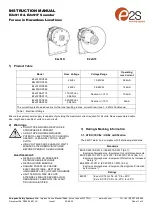
4-1
4. MAINTENANCE &
TROUBLESHOOTING
This chapter tells you how to keep your
radar in good working order. Before
reviewing this chapter please read the
safety information which follows.
Do not open the equipment.
Only qualified personnel should
work inside the equipment.
RF RADIATION HAZARD
The radar antenna emits high
frequency radio radiation which
can be harmful, particularly to your eyes.
Never look directly into the antenna from a
distance of less than 1 m when the radar is
in operation as you could injure the cornea
of your eyes. Always make sure the radar is
set to stand-by or is turned off before
starting work on the antenna unit.
WARNING
4.1 Preventative
Maintenance
Regular maintenance is important for good
performance. Always keep the equipment
as free as possible from dirt, dust, and
water splashes. Make sure all screws
securing the components are properly
tightened.
A maintenance program should be
established and should at least include the
items listed in Table 4-1.
Table 4-1 Recommended maintenance program
Period
3 to 6
months
6 months
to 1 year
Item
Exposed
nuts and
bolts on
antenna unit
Antenna
radiator
Terminal
strips and
plugs in
antenna unit
LCD
Display unit
connectors
Check point
Check for corrorded or loosened nuts
and bolts. If necessary, clean and
repaint them thickly. Replace them if
heavily corroded.
Check for dirt and cracks on radiator
surface. thick dirt should be wiped off
with soft cloth dampened with fresh
water. If a crack is found, apply a slight
amount of sealing compound or
adhesive as a temporary remedy, then
call for repair.
Open antenna cover to check terminal
strip and plug connections inside. Also
check the rubber gasket of antenna
covers for deterioration.
The LCD will, in time, accumulate a
coating of dust which tends to dim the
picture. Wipe LCD lightly with a soft
cloth.
Check for tight connection and
corrosion.
Remarks
Sealing compound may be used
instead of paint. Apply a small
amount of grease between nuts
and bolts for easy removal in future.
Do not use plastic solvent (acetone)
for cleaning. If you need to remove
ice from antenna unit, use a
wooden hammer or plastic head
hammer. Crack on the unit may
cause water ingress, causing
serious damages to internal circuits.
When closing antenna covers in
position, be careful not to catch
loose wires between covers and
unit.
Do not use chemical cleaners to
clean any part of the display unit;
they can remove paint and
markings.
If corroded, contact your dealer
for replacement.










































